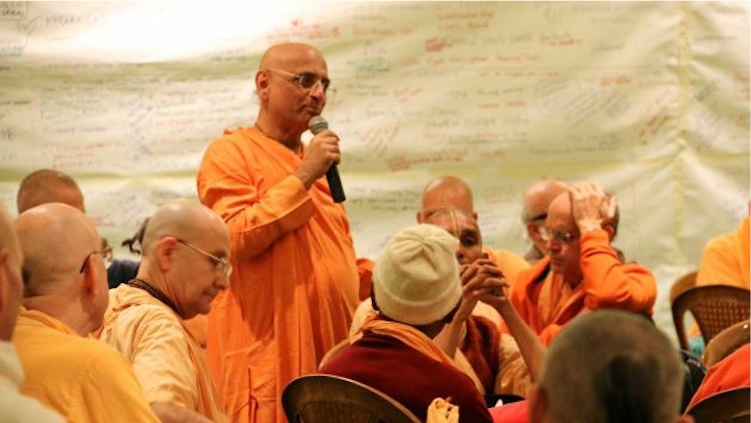Mayapur Sanga of ISKCON Sannyasis, Gurus and GBCs – Day Two
By ISKCON GBC Community Relations Office of the Strategic Planning Network | Фев 11, 2015

On Day One of the ISKCON sannyasis and gurus in Mayapur participants explored ISKCON’s past, examining the trends in and influences on ISKCON, both internal and external. Following from that, on the second day participants began to look at ISKCON’s present. The meeting’s facilitator’s started with a question: How well do the four groups in the room (the GBC members, the sannyasis, the gurus, and the BBT trustees) address the trends in ISKCON. They were asked to list their perception of the strengths and weaknesses of each of the four groups of devotees.
For example, this is what the group came up with under “sannyasis”:
Strength: As sannyasis travel and preach, they not only provide an essential example of detachment, determination, erudition, and purity, but in the process they themselves are exposed to ISKCON worldwide, a viewpoint individual temple leaders may not have the opportunity to gather, and so are in a position to guide temple management in regards to trends within and outside our movement.
Weakness: Sannyasa-dharma has never really been defined for ISKCON, which can lead to unclear and inappropriate expectations. Also, too much travel may have the effect of making it difficult to accurately assess the trends in ISKCON, and so an inability to have sufficient impact on and an insensitivity to the needs and trends that affect the other ashrams.
An example of what was written under “gurus”:
Strength: The gurus take on the burden of accepting and caring for disciples, inspiring devotees to remain faithful to Srila Prabhupada. They carry authority and therefore influence.
Weakness: The gurus often create movements within the Movement, opening the door to potential schisms. They initiate devotees in places they visit infrequently and then leave local leaders to care for their disciples who may not have a sufficient relationship or authority over those disciples.
The discussion on the “GBC” elicited the following examples:
Strength: The GBC has a diverse membership and is united and loyal to ISKCON and Srila Prabhupada’s hopes for the movement. The GBC has been a good example of cooperation and fortitude in dealing with the myriad challenges over the decades. The GBC has held ISKCON together in the past, and at present is showing leadership by itself encouraging senior devotees to get more involved in deciding ISKCON’s future.
Weakness: Many devotees don’t have faith in the GBC, seeing it as lacking relevance. The GBC doesn’t generally communicate and explain its decisions or its decision-making process, and doesn’t delegate to or empower devotees who are not in its ranks.
And finally, from the discussion on the “BBT” (Bhaktivedanta Book Trust)”:
Strength: Books are being produced in different languages (no matter how small the readership in those languages is), with quality editing, production, and visual beauty. The BBT is successfully addressing the outside trend toward digital books.
Weakness: Has not managed to sufficiently educate devotees about the rationale behind the changes made to Srila Prabhupada’s books and what they call “responsible publishing.” The BBT has also not attracted ISKCON writers to publish with them as per Srila Prabhupada’s desire.
The discussions were dynamic and pertinent, and then the participants broke for lunch. After lunch, the participants stood before a large banner on the wall with an important excerpt from a letter from Srila Prabhupada:
“This is called unity in diversity. I am therefore suggesting that all our men meet in Mayapur every year during the birth anniversary of Lord Caitanya Mahaprabhu. With all GBC and senior men present we should discuss how to make unity in diversity. But, if we fight on account of diversity, then it is simply the material platform. Please try to maintain the philosophy of unity in diversity. That will make our movement successful.”
Giriraja Swami, Radhanath Swami, and Anuttama Prabhu were invited, one after another, to read the excerpt aloud, and time was given for everyone to meditate on Srila Prabhupada’s words. Participants were then asked to work in pairs in any place they liked for the next hour and a half to discuss this key instruction. Devotees were found in deep discussion on the bank of the Ganges, at the Jagannath Mandir, at Srila Prabhupada’s Samadhi, and at various other places around the ISKCON campus.
Most said they appreciated the opportunity to spend time with one other devotee and focus on this one instruction by Srila Prabhupada, because if we could follow this one instruction, it would have a powerful impact on our Society.
The day ended on a high note, with the promise that the third and last day will focus on ISKCON’s future.















